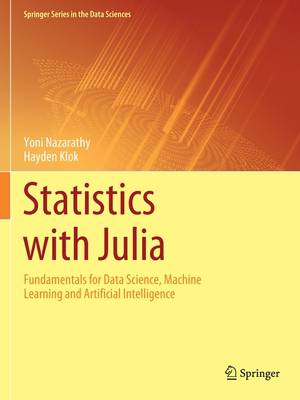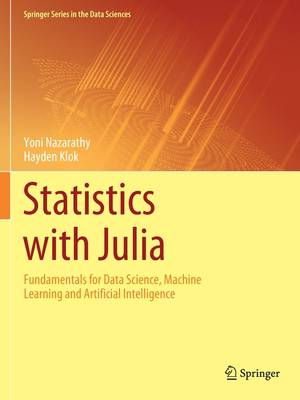
- Afhalen na 1 uur in een winkel met voorraad
- Gratis thuislevering in België vanaf € 30
- Ruim aanbod met 7 miljoen producten
- Afhalen na 1 uur in een winkel met voorraad
- Gratis thuislevering in België vanaf € 30
- Ruim aanbod met 7 miljoen producten
Zoeken
Statistics with Julia
Fundamentals for Data Science, Machine Learning and Artificial Intelligence
Yoni Nazarathy, Hayden Klok
€ 189,95
+ 379 punten
Uitvoering
Omschrijving
This monograph uses the Julia language to guide the reader through an exploration of the fundamental concepts of probability and statistics, all with a view of mastering machine learning, data science, and artificial intelligence. The text does not require any prior statistical knowledge and only assumes a basic understanding of programming and mathematical notation. It is accessible to practitioners and researchers in data science, machine learning, bio-statistics, finance, or engineering who may wish to solidify their knowledge of probability and statistics.
The book progresses through ten independent chapters starting with an introduction of Julia, and moving through basic probability, distributions, statistical inference, regression analysis, machine learning methods, and the use of Monte Carlo simulation for dynamic stochastic models. Ultimately this text introduces the Julia programming language as a computational tool, uniquely addressing end-users rather than developers. It makes heavy use of over 200 code examples to illustrate dozens of key statistical concepts. The Julia code, written in a simple format with parameters that can be easily modified, is also available for download from the book's associated GitHub repository online.
See what co-creators of the Julia language are saying about the book:
Professor Alan Edelman, MIT: With "Statistics with Julia", Yoni and Hayden have written an easy to read, well organized, modern introduction to statistics. The code may be looked at, and understood on the static pages of a book, or even better, when running live on a computer. Everything you need is here in one nicely written self-contained reference.
Dr. Viral Shah, CEO of Julia Computing: Yoni and Hayden provide a modern way to learn statistics with the Julia programming language.This book has been perfected through iteration over several semesters in the classroom. It prepares the reader with two complementary skills - statistical reasoning with hands on experience and working with large datasets through training in Julia.
The book progresses through ten independent chapters starting with an introduction of Julia, and moving through basic probability, distributions, statistical inference, regression analysis, machine learning methods, and the use of Monte Carlo simulation for dynamic stochastic models. Ultimately this text introduces the Julia programming language as a computational tool, uniquely addressing end-users rather than developers. It makes heavy use of over 200 code examples to illustrate dozens of key statistical concepts. The Julia code, written in a simple format with parameters that can be easily modified, is also available for download from the book's associated GitHub repository online.
See what co-creators of the Julia language are saying about the book:
Professor Alan Edelman, MIT: With "Statistics with Julia", Yoni and Hayden have written an easy to read, well organized, modern introduction to statistics. The code may be looked at, and understood on the static pages of a book, or even better, when running live on a computer. Everything you need is here in one nicely written self-contained reference.
Dr. Viral Shah, CEO of Julia Computing: Yoni and Hayden provide a modern way to learn statistics with the Julia programming language.This book has been perfected through iteration over several semesters in the classroom. It prepares the reader with two complementary skills - statistical reasoning with hands on experience and working with large datasets through training in Julia.
Specificaties
Betrokkenen
- Auteur(s):
- Uitgeverij:
Inhoud
- Aantal bladzijden:
- 527
- Taal:
- Engels
- Reeks:
Eigenschappen
- Productcode (EAN):
- 9783030709037
- Verschijningsdatum:
- 5/09/2022
- Uitvoering:
- Paperback
- Formaat:
- Trade paperback (VS)
- Afmetingen:
- 210 mm x 279 mm
- Gewicht:
- 1197 g

Alleen bij Standaard Boekhandel
+ 379 punten op je klantenkaart van Standaard Boekhandel
Beoordelingen
We publiceren alleen reviews die voldoen aan de voorwaarden voor reviews. Bekijk onze voorwaarden voor reviews.











